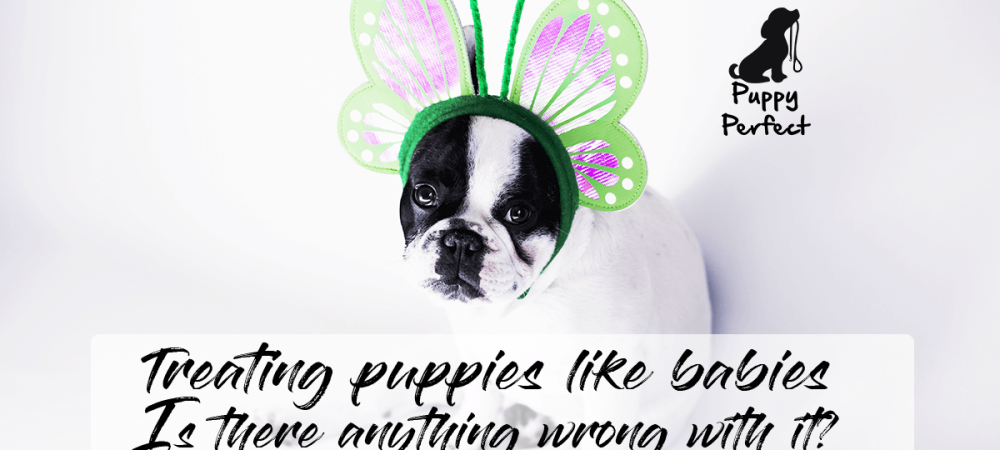What’s wrong with treating a puppy like a baby?

Getting a new puppy is incredibly exciting and, given that they are so small, innocent and adorable, it is no wonder that so many people treat adopting a puppy in the same way they would bringing a newborn baby home. However, it is important to understand that adopting the same attitudes isn’t always the best thing, and can have negative consequences for both the puppy and the owners, if taken to the extreme. Of course, there are manny transferable skills that can be applied from parenting to caring for a dog, but it is important that it does not become excessive.
How puppy (and dog) status is derived
Most importantly, puppies are not the same as human babies. Unlike humans, puppies are born in litters and, from the day they are born, have a particular position within a hierarchy, and this continues as they are adopted by a family. As soon as your puppy settles into your home, they learn their position in the hierarchy relative to how you and your family behave around them. This is dependant on who is in authority, who decides when the puppy eats and who instigates play with the puppy- you or the animals?
Your puppy will pick up on how each of you behaves when they are testing boundaries, and will always situate themselves in the hierarchy accordingly. For example, if you are always strict with the puppy and tell them no, but your partner gives in, your puppy will situate themselves between you in the hierarchy of your household.
In every situation where authority is visible, whether that be through feeding or play, the puppy can either view that interaction as “puppy led” ( i.e. “I want to eat/play now”), or the situation can be framed and controlled in order to make it “human led” (i.e. “I have decided that you can eat this much food at this particular time”). The only way that this can be achieved is by establishing your control, implementing boundaries and teaching commands that must be respected from the very start of the relationship with your puppy.
Give your puppy black and white rules
This means it is important that you know how to say “no” to your puppy, without feeling guilty. In fact, puppies are much happier when they know the rules and boundaries. Spoiling them for no reason can actually confuse them, as they become burdened with a sense of control that they don’t know how to handle.
Puppies need to be corrected, but this needs to be done clearly and authoritatively, with no room for negotiation. Even if your puppy begins to cry, you must stick to your original “No” in order to maintain your position of authority. Similarly, you should never give in to comforting your puppy just because they have started yapping at you for attention- the attention should always be given on your terms. These rules need to be applied, whatever the circumstance with no sort of flexibility.
Are you acting in your own, or the puppy’s interests?
When it comes to raising a child, parents have free rein to bring them up as they wish (within reason), as they have other ways of learning how to behave in the world, but this has very different consequences when raising a puppy. The issue is that treating a puppy as a baby and over-indulging it is really just bringing it up with a lack of rules and boundaries. This can lead to overconfidence, poor manners (with humans and other dogs) and serious behavioural problems. Not only can this be problematic for you as a dog owner, it is unfair for your dog to not understand what they can and can’t do. It’s for this reason that you need to reconsider why you are treating your puppy like a baby. Are you spoiling them because you want to feel their love for and dependence on you? If so, that’s a problem and it is not fair on your puppy. It is important that you are honest with yourself about your motivations and consider how just your behaviour is. Please also reassure yourself that your puppy will still love and like you every bit as much (and probably respect you more) by showing discipline and authority. Secondly,
Of course, it is normal to love and care for your puppy, but it is important that this affection is not taken to extremes. Your puppy should always recognise you as an authority figure as they are growing up in order that they respect and obey you.
If you would like any further advice on caring for and training puppies, contact Nikki at Puppy Perfect by emailing nikki@puppy-perfect.co.uk or calling 07947 882712